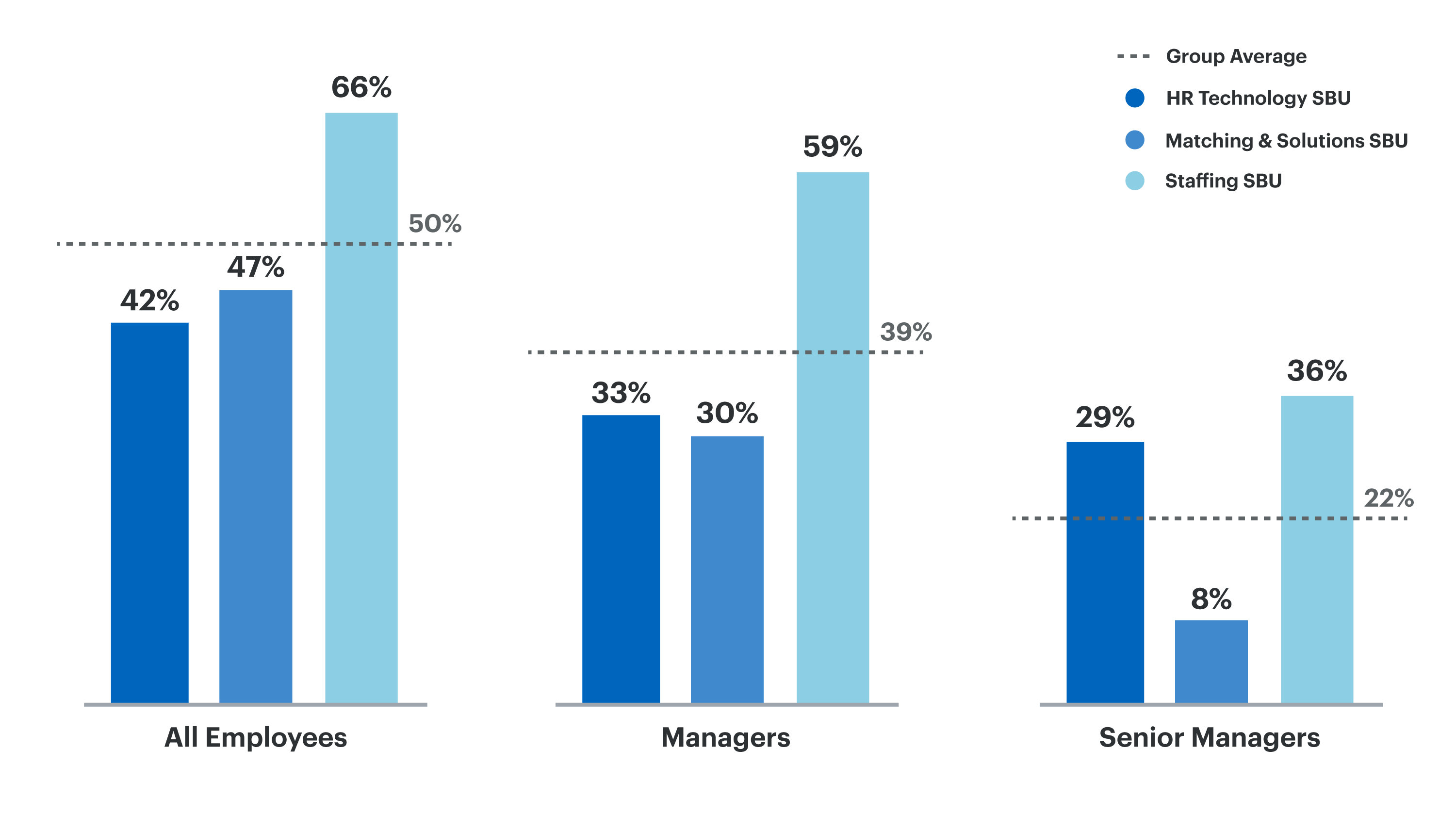Recruit Holdings held an ESG Fireside Chat on July 4, 2023, to discuss the progress of our Commitment to Sustainability - Prosper Together in FY2022. Ayano “Sena” Senaha, Director, Executive Vice President, and COO in charge of Sustainability, and Junichi “Jun” Arai, Senior Vice President of Corporate Strategy and Investor Relations, shared the positive signs and challenges they have faced, as well as their commitment to ESG expanding on the financial announcement materials.
Dialogue With Hard-hitting Questions
In the first half of hosting the fireside chat, Jun asked Sena some of the questions received in advance to discuss the progress on ESG initiatives, addressing information that investors seek but find difficult to inquire about. After that, Jun posed numerous challenging questions to Sena, which were submitted during the live chat.
Participants commented, "The two of them spoke frankly, and I felt as if I was there," and, "I could sense that they were trying to convey their true feelings without hiding the good and the bad." Although the progress for FY2022 was reported in the financial announcement, this open and interactive event allowed participants to feel the Recruit Group's passion, struggle, and commitment on the front lines, which cannot be fully conveyed through financial announcement materials alone.

Junichi “Jun” Arai, Senior Vice President of Corporate Strategy and Investor Relations (left) sits down with Ayano “Sena” Senaha, Director, Executive Vice President, and COO in charge of Sustainability (right) during the Fireside Chat.
Reflecting FY2022 with Data
In her candid assessment of FY2022 progress, Sena admitted that the team was making good progress on some goals, but that others were more difficult and challenging than we had anticipated. She backed up her statements with data.
The three goals that are excelling are achieving carbon neutrality, helping 30 million jobseekers get hired, and achieving gender parity in the boardroom.
Sena began by reporting on Recruit Group's progress in achieving carbon neutrality across its entire value chain. Recruit Group has obtained certification from the Science Based Targets initiative (SBTi) to demonstrate that its GHG reduction target is based on scientific evidence, and that it has made significant progress in reducing emissions from its own activities as well as its supply chain activities. The company has also helped 3.9 million people facing barriers find jobs over the past two years, making significant strides toward its goal of helping 30 million jobseekers facing barriers get hired
. Finally, Sena noted that for the second year in a row, a female director has been appointed, increasing the percentage of women on the Board to 33%, and making progress toward achieving gender parity among the members of the Board of Directors
.
Challenges have emerged for goals as we progressed.
On the other hand, for the goal to reduce the time to get hired by half, Sena revealed that identifying and measuring the beginning of a job search is a challenge, as people take different actions on the platform. Measuring the time for a job search is still in the trial and error phase. However, she said that she has started seeing positive signs of reducing the hiring time as the products evolve. For example, companies that use Indeed Assessment could hire 16% faster.
Sena explained that the significant challenge for Recruit Group is the low ratio of female management in the HR Technology and Matching & Solutions Strategic Business Units (SBUs) regarding the Group's DEI (Diversity, Equity, and Inclusion) goal of achieving gender parity at all job levels. Low female management is evident in the following chart, which discloses the figures for each SBU for the first time.

Staffing SBU achieved gender parity at the employee and manager levels
Indeed, part of HR technology SBU, is focusing on improving gender balance during the hiring process since promotion and retirement rates are virtually the same for men and women in those two categories. In FY2021, the company adopted the Inclusive Interview Rule, which requires interviews to begin after the diversity of the candidate pool is confirmed. Sena explained that while the Inclusive Interview Rule improved gender balance in FY2021, the effect was not as significant in FY2022 due to headcount reductions and a hiring freeze. Efforts are underway to apply the Inclusive Interview Rule to internal promotions. For Matching and Solution SBU, Sena said, "We are seeing good signs," attributing this to the determination of Recruit Co., Ltd. to further the Group's goal to incorporate them into its three-year plan. Additionally, we now have more diverse candidates by stipulating the requirements for managers and reducing room for bias in the selection process.*1
*1 Efforts to eliminate biases, such as a uniform working style and a leadership image, when selecting candidates for management positions to ensure candidates are selected based on their individual abilities.
Q&A Session Digest
We received a large number of questions in advance through the questionnaire form and in real time via chat. Here are two of those that Sena answered during the event.
Q. Job seekers vary in their reasons for seeking a new job, from those who are uncomfortable with the relationships at their current workplace to those who are not sure what they want from a job. It is often the case that the process of identifying a job seeker's desired condition takes the most time. Can this be shortened? Is it always true that the faster the better?
Sena: Our objective is to "halve the time it takes to get hired," which implies that it involves the accuracy of matching. If we attempt to shorten the job search process in parts, such as the process from checking a job posting to applying for a job or until actually going to an interview, we do not need to discuss the "quality" of the matching process. However, we are stating that we will cut the time in half for the entire process until the job seeker is hired. If we fail to present the job information that fits the job seeker's needs, they will not get hired.
Therefore, to achieve the goal, the accuracy of this matching and the ability to make recommendations that are perfect for each user will also play a vital role. We cannot ignore the importance of quality. We will continue to work on improving the accuracy of the matching platform.
Q. How does the goal of "helping 30 million jobseekers facing barriers get hired" align with and contribute to the overall improvement of Recruit Group's corporate value?
Sena: We are developing our products based on knowledge gained through partnerships with NPOs and other support groups around each barrier. One example is Skill Connect, recently launched by Indeed. It allows people facing barriers to take job training programs and have the resulting skills automatically reflected on their resumes. The standard resume format did not allow people to showcase the skills and experience they gained from the job training programs they attended. There was no place to write or express your skills and experiences. We realized that this had to be improved, so we changed the format of the resume itself so that employers can use the skills information to screen applicants. In this way, I believe that reflecting the knowledge gained while working hard toward the goal of helping 30 million jobseekers in the product itself and pursuing more and better matching will lead to long-term product evolution and corporate value.
We Prioritize Working on ESG Even in Challenging Business Climates Because ESG is Intricately Linked to Our Core Business
Toward the dialogue's conclusion, Jun prefaced the conversation by stating, "It is my responsibility to pose challenging questions," and proceeded to ask a final question.
Jun: In our earnings announcement in May, we said that the business environment was severe, that sales and profits were down, that we could not provide a forecast for the entire year, and that we would cut costs. You may ask why we are undertaking ESG initiatives in such a severe business environment. Shouldn't we focus more on our core business? What is your intention to vigorously promote ESG at a time like this?
Sena: The answer, I believe, is "I consider it to be my core business." We don't want to do something small and sound on the side of our business. We have set this goal to make a decent profit in our core business and contribute to society. Simply put, halving the time it takes to get hired means doubling the efficiency of the matching process. We do not claim that doubling the matching efficiency will double the monetization opportunities, but we do it because we believe that it will contribute to sales and profits in the long run. To put it very positively, I'm not just talking about the scale of being number one; I even think that if we could cut the time in half, we might even be the only one in the world to achieve this.
Some may ask, "Can we afford to think about diversity in these uncertain times?" We are not a manufacturer, and we do not have patents we can rely on for decades, so we must continue innovating. Therefore, having a diverse group of people join us is a survival mechanism determining our company's success. Diversity is essential in this sense, and I believe it is the heart of our business.
Jun: Even so, I think some people might ask, "What about short-term returns?”
Sena: To share one of our latest and the greatests, for instance, our ESG rating has skyrocketed, and we are reaping short-term benefits that we can clearly capitalize on. I am pleased with that, but I would like to take a longer-term view and make it an initiative that contributes to the long-term growth of our company. I want to make it something that is profitable in the long run. That is why we have included it as one of our medium- to long-term business strategies.
The ESG Fireside Chat was concluded with Sena's powerful words. Check the full video to learn more.